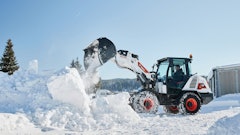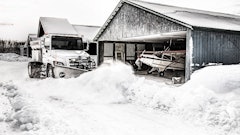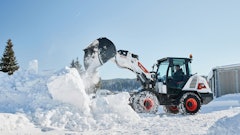
Winter is approaching, and with it comes the challenge of managing snowplow performance in extreme weather conditions. The freezing temperatures associated with winter can have a significant impact on your snowplow's hydraulic system and understanding why is crucial for maintaining optimal performance.
The primary issue lies in the viscosity of the hydraulic fluid. In wintry conditions, this fluid thickens, which reduces its ability to flow efficiently through the system. This increased viscosity can lead to less responsive, sluggish operations, making it harder for the snowplow to perform effectively. Moreover, the thickened fluid can strain the hydraulic pump and other components, potentially leading to wear and tear. In severely cold weather, where temperatures fall below 0 degrees, pump cavitation can occur, devastating to the system, as metal contaminants are pumped throughout, causing downstream contamination in various other components. Regular checks and using a winter-grade, lightweight hydraulic fluid can help mitigate these issues, helping your snowplow operate smoothly and efficiently even in the harshest conditions.
Below is an industry standard to reference for hydraulic oil viscosities versus ambient temperatures:
Low temperatures can also cause seals to harden and become brittle, significantly increasing the risk of leaks in hydraulic systems. These leaks not only affect the system's performance by reducing efficiency and pressure but can also lead to costly repairs and potential downtime. If left unchecked, brittle seals and subsequent leaks can cause extensive damage to the entire hydraulic system, impacting other components and leading to further complications. Regular maintenance and monitoring are essential to prevent such issues and ensure long-term reliability and functionality.
Proactive maintenance strategies
To combat these challenges, proactive maintenance is key. Here are some tips to ensure your snowplow hydraulic systems remain in peak condition even in freezing temperatures:
1. Use cold-weather hydraulic fluids:
Select a hydraulic fluid specifically formulated for low-temperature environments. These specialized fluids are designed to maintain optimal viscosity levels even when the mercury drops significantly. Additionally, using the appropriate fluid can prolong the lifespan of machinery by reducing wear and tear caused by inadequate lubrication in low temperatures. Investing in the right hydraulic fluid safeguards your equipment and ensures reliable operation in challenging climates.
2. Prewinter system check:
Before the winter season sets in, perform a comprehensive check of your hydraulic system. This involves carefully inspecting all components, including hoses, cylinders and fittings, for any signs of wear and tear. Address any minor repairs immediately and replace worn-out parts to prevent future failures that could occur when the system is under stress from cold temperatures. Then, regular inspections throughout the season ensure optimal performance and extend the lifespan of your equipment.
3. Temperature control:
If possible, store your snowplows in a temperature-controlled environment to minimize exposure to extreme cold, which can affect their mechanical components and reduce efficiency. In such a setting, the plow's hydraulic system and electrical parts are less likely to undergo stress from fluctuating temperatures. At the very least, ensure they are sheltered from direct snowfall and ice buildup, as prolonged exposure can lead to rust and corrosion, ultimately affecting the longevity and reliability of the equipment.
4. Warmup procedures:
Implement a comprehensive warm-up routine before fully operating the snowplow. Start by allowing the engine to idle, which helps bring all mechanical components to life gradually. Let the hydraulic fluid circulate throughout the system for a few minutes to ensure it reaches an optimal operating temperature. This practice enhances performance and prevents unnecessary strain on the equipment, extending the snowplow's life.
Investing in high-quality components
The quality of your hydraulic components plays a crucial role in maintaining system performance, especially during the winter months. Freezing weather can impose significant stress on hydraulic systems, potentially leading to failures if components are not up to the task. Using high-grade materials and precision engineering ensures that your components can withstand these harsh conditions. Investing in top-tier cylinders, pumps and valves ensures reliability and longevity and minimizes the risk of costly downtime and repairs. By choosing superior components, you’re safeguarding your operations against the unpredictable and demanding winter environment, allowing for smoother, more efficient performance year-round.
Future trends in hydraulic technology
Looking ahead, advances in hydraulic technology promise to significantly improve snowplow performance even further. As winters become increasingly unpredictable, the demand for more efficient snow removal solutions is growing. Innovations such as smart sensors for real-time diagnostics will allow operators to monitor equipment performance and anticipate maintenance needs. Additionally, adaptive fluid technology that adjusts viscosity on demand ensures optimal functionality in varying temperatures, maintaining consistent power and efficiency. Environmentally sustainable hydraulic fluids are also on the horizon. These groundbreaking developments will enhance efficiency, reduce environmental impact, and provide snowplow operators with cutting-edge tools to effectively face changing weather patterns, ensuring safer and clearer roads for everyone.
By understanding the impact of cold weather, implementing proactive maintenance, investing in quality components and staying updated on technological advancements, snowplow operators and fleet managers can maintain smooth operations all winter long.


























